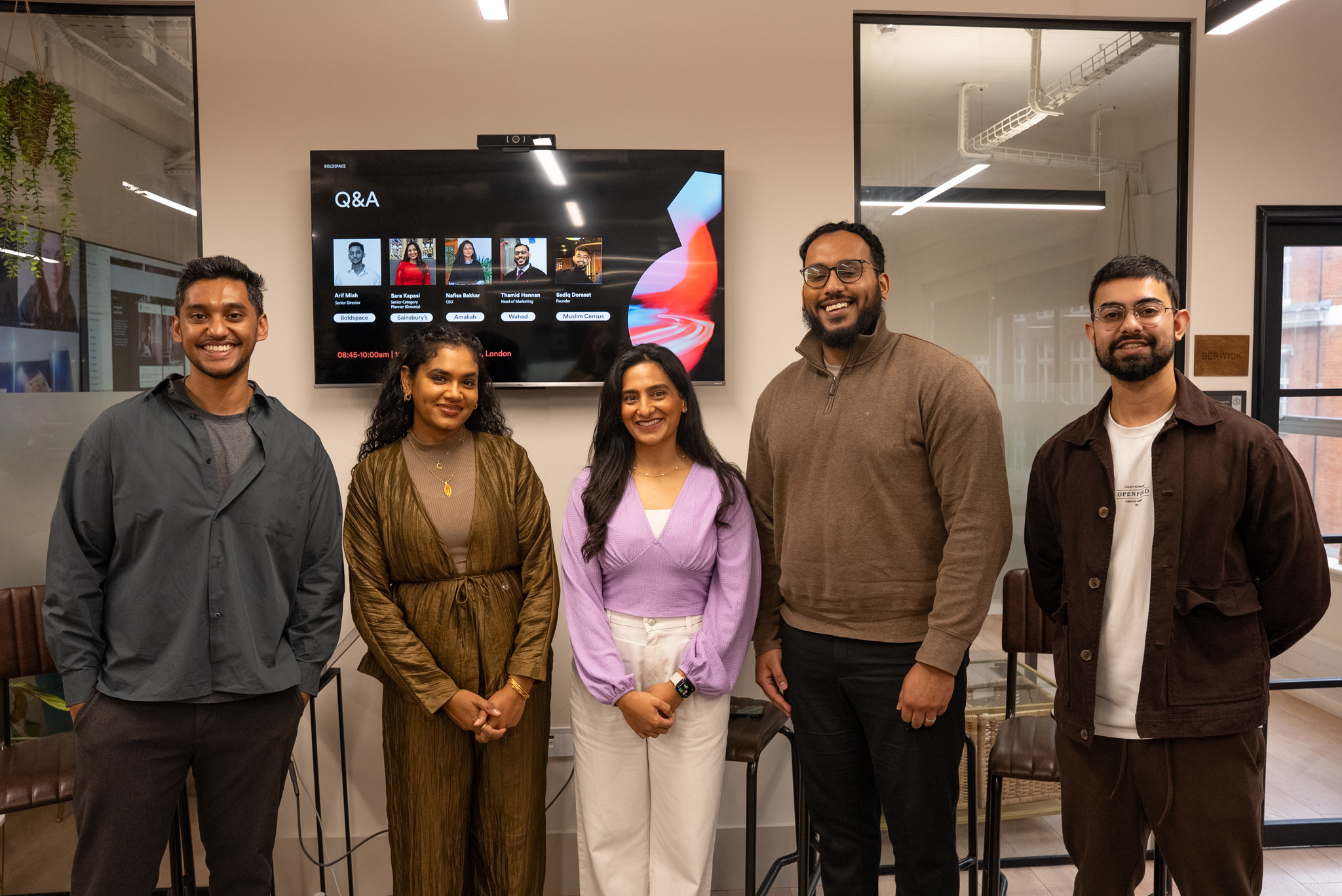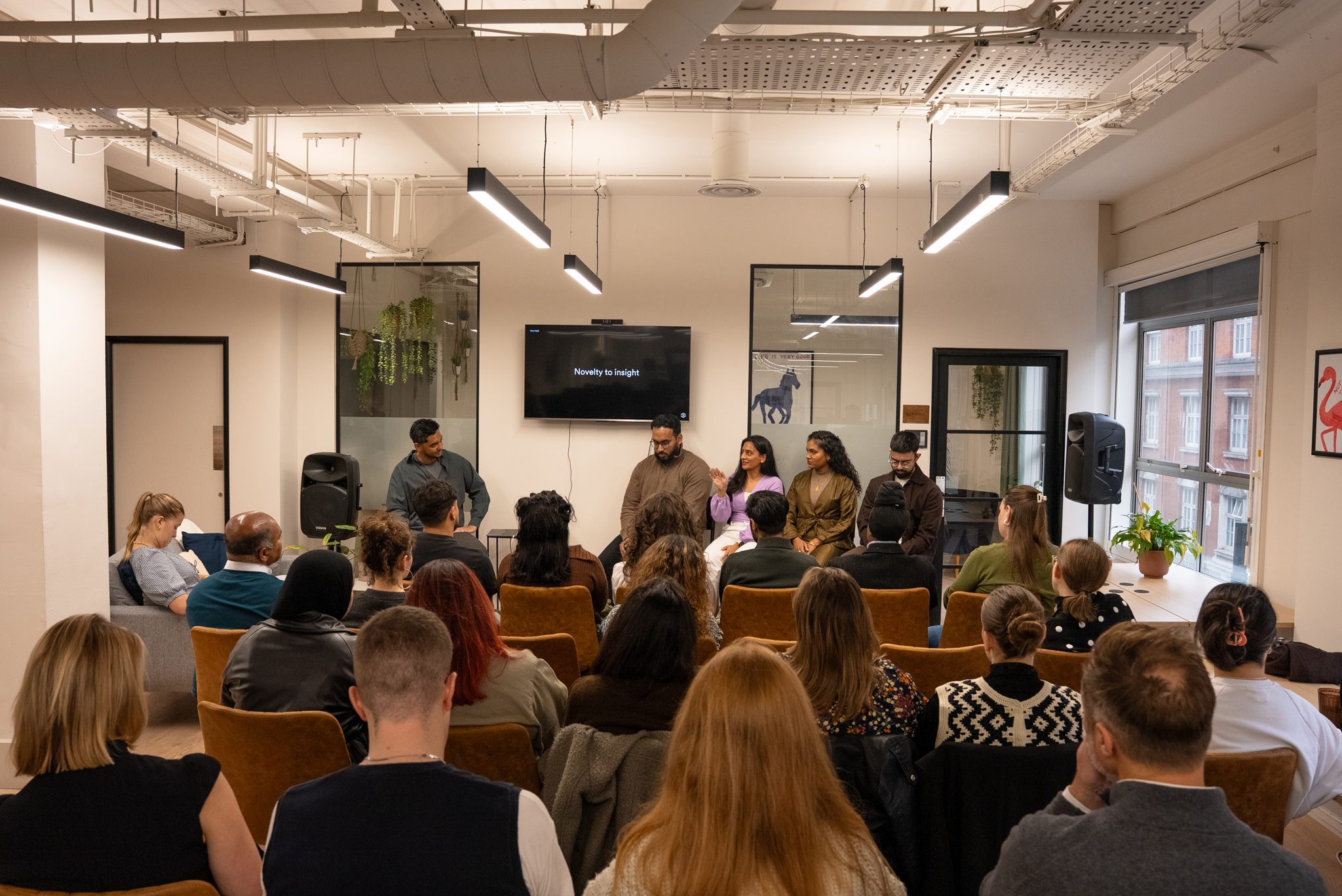21 October 2025
Key Takeaways from The Countdown to Ramadan
Recently, Senior Director, Arif Miah hosted a panel event ‘The Countdown to Ramadan: How brands can get it right‘, exploring the marketing opportunity of Ramadan, and how brands can show up in ways that are culturally intelligent and commercially effective.
We were joined by an incredible panel of industry leaders that have masterfully engaged throughout Ramadan, built connections with a new audience and reaped the long-term rewards as a result:
- Sara Kapasi – Senior Category Planner at Sainsbury’s
- Thamid Hannan – Head of Marketing at Wahed
- Sadiq Dorasat – Founder of Muslim Census
- Nafisa Bakkar – CEO of Amaliah
- Arif Miah – Senior Director at Boldspace (Chair)

Why should your brand get involved in Ramadan?
During Ramadan, monthly spending among British Muslims triples, driven by a unique rhythm of faith, family, and festivity. Fasting by day leads to feasting by night, fuelling growth across food, dining, gifting, fashion, and charity. The result is not just a moment of reflection, but a dynamic commercial and cultural season embedded in modern British life.
As the occasion continues to grow in cultural significance and commercial scale, brands have an opportunity, and a responsibility, to engage with empathy, authenticity, insight and understanding.
Below, we outline six key considerations brands should make when engaging with the Ramadan festivities in 2026.
Six key takeaways for brands from The Countdown to Ramadan
1. Embracing Ambiculture
British Muslims don’t juggle two identities – they live one blended culture. Yet many Ramadan campaigns still rely on imported tropes that miss the unique UK context. Today’s Muslims are largely UK-born, young, urban, and confident in being both – very British and very Muslim. They’re as fluent in Nando’s and Netflix as they are in iftar and Eid. Online, trends like #EidInTheUK have grown 120% year-on-year, showing how seamlessly faith and modern British life coexist. Brands must move beyond tokenism to reflect this dual confidence, a culture that fuses faith with familiarity.
2. Reflecting modern realities
British Muslims over-index on education and ambition, representing 11% of UK undergraduates, with 90% of 18-year-olds going on to university. They’re young, urban, and digitally connected – reshaping how Ramadan is lived. Smaller households, rising renting, and professional routines mean many now break fast at work or on the go. Faith remains constant, but its expression adapts through convenience, community, and culture. Unlike Christmas, which leans on nostalgia, a new generation of Muslims is rewriting the norms of Ramadan, blending spirituality with modern British life. Brands must capture this evolution, not the heritage image of the past.
3. Novelty to insight
Too many brands fixate on the quirks of Ramadan – moons, dates, lanterns, rather than its festive moment. For Muslims, these are hygiene symbols, not emotional truths. The real power lies in Ramadan’s emotional arcs: celebration and discipline, relief and gratitude, togetherness and giving. Studies show British Muslims respond most to authentic, emotionally resonant storytelling, not decorative tokenism, yet two-thirds feel brands don’t understand them. Smart brands move beyond surface tropes to reflect the lived emotion, rhythm, and progression of the month.
4. Global ≠ Local
Global Ramadan campaigns often lose meaning when imported wholesale. What resonates in the Gulf can feel misplaced in the UK, where Ramadan is lived through BAU. Co-creating with local specialists ensures authenticity and nuance. At the same time, the UK also welcomes a “Ramadan Rush” of high-spend Gulf visitors, boosting luxury, hospitality, and retail. Smart brands tailor experiences, connecting global intent with local reality.
5. Tapping into the timetable
Ramadan has a natural emotional rhythm, and brands should move with it. Pre-Ramadan is about anticipation and preparation, so messaging should feel energising and purposeful. The first 10 days bring optimism and community a time for uplifting, celebratory storytelling. In the middle 10 days, morale dips; tone should soften, offering empathy, encouragement, and balance. The last 10 nights mark the emotional and spiritual peak where themes of generosity, reflection, and renewal connect most deeply. By mirroring these shifts, brands show emotional intelligence, pacing communication with people’s lived rhythm, not just the marketing calendar.
6. Observe and optimise
Ramadan isn’t just a cultural moment, it’s a month of behavioural change. Routines, diets, and spending all shift, creating space for brands to be useful, not just visible. The real opportunity lies in optimisation: framing products and services that genuinely adds value to Ramadan life. Optimisation is empathy – solving real needs rather than seasonal branding. The most impactful brands observe, learn, and refine each year, enabling participation instead of merely acknowledging it.
Looking to play a meaningful role this Ramadan?
To understand how to start engaging with the British Muslim community in a way that feels authentic and purposeful, get in touch with our Senior Director and event host, Arif Miah.
arif.miah@boldspace.com
